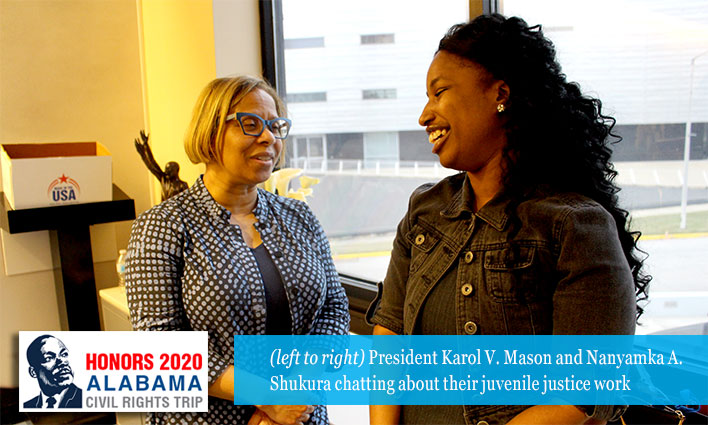
One of the speakers that inspired our Honors students during the Alabama Civil Rights trip was Nanyamka A. Shukura, the Southern Poverty Law Center (SPLC) Senior Community Advocate. At the SPLC Shukura focuses on juvenile justice issues in their Children’s Rights Practice Group. When talking about dismantling the oppressive school-to-prison pipeline affecting children in Alabama—specifically impacting students of color—you could hear the genuine passion in her voice. That passion stemmed from a personal experience that she shared with the group.
Shukura explained that one day, in high school, like any other teenager kidding around in the lunch line, she skipped the line.
“Those two words—not her—changed my path from the school-to-prison pipeline to the school-to-possibilities pathway.” —Nanyamka A. Shukura
“I was told to get out of the line by a staff member, and like any typical teenager, I refused. The staff member asked the school resource officer to come help. The officer told me to get out of the line, but because my food was already in my hand, I refused,” said Shukura. “The officer grabbed me by my arm, dragged me out of the cafeteria, and told me that I was going to be charged with inciting a riot. When we got to the office, I started crying and noticed that my Spanish teacher was there. She looked at me and she looked at the officer. Then she stepped into advocacy mode and said two words that I will never forget—‘not her.’”

Southern Poverty Law Center Senior Community Advocate on her powerful speech
Shukura explained that it was those two simple words that changed her life. It was those two words that gave her a second chance. It was those two words that meant that she could go back to class instead of a juvenile detention center. “Those two words—not her—changed my path from the school-to-prison pipeline to the school-to-possibilities pathway,” said Shukura. “Now, I’m able to pay it forward and help many children in the South, using those very same words.”
President Mason, and the students on the Honors trip, found connections between Shukura’s experience as a teen, and the experiences they either had themselves or studied as scholars researching juvenile justice issues.
“It’s my mission in life to be that advocate, to be that person in the room that says ‘not her’ or ‘not him’ and recognizes the full potential and humanity of a child,” said Shukura.



